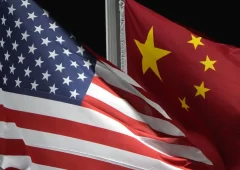Bitcoin Finds a New Role in Global Trade as Nations Look Beyond the Dollar
10.04.2025 11:00 2 min. read Alexander Stefanov
World Liberty Financial (WLFI), a decentralized finance platform positioning itself as a response to growing distrust in traditional systems, may soon find validation in the changing landscape of international trade.
Major global powers are beginning to experiment with Bitcoin as more than just an investment—some are now using it as a currency for cross-border energy deals.
According to VanEck, China and Russia have already begun settling parts of their energy trade using Bitcoin and other digital assets. This shift signals a broader effort to reduce dependency on the U.S. dollar and insulate transactions from Western financial infrastructure.
Other nations are taking similar steps—Bolivia, for instance, recently announced plans to import electricity using crypto, while French utility company EDF is reportedly testing Bitcoin mining as a way to utilize excess energy exports.
These moves align with World Liberty’s founding message: to build an alternative financial framework for those sidelined by centralized systems. Backed by former U.S. President Donald Trump, the project promotes financial independence through decentralized tools, including cryptocurrency adoption.
Despite market volatility, Bitcoin has consistently outpaced traditional indexes like the Nasdaq, with VanEck’s Matthew Sigel pointing out that macroeconomic shifts may further support its rise. If U.S. growth slows and inflation remains in check, the Federal Reserve could pivot toward lower interest rates—conditions that have historically fueled Bitcoin rallies.
Sigel also emphasized watching the U.S. Dollar Index (DXY). A weakening dollar, coupled with geopolitical shifts, could accelerate Bitcoin’s transition from speculative asset to global settlement currency.
For projects like World Liberty, the message is clear: the tide may finally be turning toward the decentralized future they’ve been building for.
-
1
Real Estate Giant Plans $300M Bitcoin Purchase
22.06.2025 13:00 2 min. read -
2
Bitcoin Below $100K? Veteran Trader Sees It as a Buying Opportunity
25.06.2025 10:00 1 min. read -
3
Bitcoin Dominates Portfolios as Institutional Adoption Surges
25.06.2025 8:00 2 min. read -
4
Market Turmoil, War Fears, and a $70 Million Bet Against Bitcoin: James Wynn’s Stark Warning
21.06.2025 16:00 2 min. read -
5
‘Nobody Saw This Coming’: Saylor Points to Political Winds Fueling Bitcoin Boom
22.06.2025 10:00 2 min. read
Trump’s Two big Bitcoin Moves: Key Catalysts or Just Noise for BTC Price?
Two major developments are converging in July that could shape the future of Bitcoin in the United States—both tied to President Trump’s administration and its expanding crypto agenda.
Crypto Inflows hit $1B Last Week as Ethereum Outshines Bitcoin in Investor Sentiment
Digital asset investment products recorded $1.04 billion in inflows last week, pushing total assets under management (AuM) to a record high of $188 billion, according to the latest report from CoinShares.
Saylor’s Strategy Halts Bitcoin Buying After Historic Accumulation
Strategy, the Bitcoin-centric firm formerly known as MicroStrategy, has temporarily paused its regular Bitcoin purchases.
Second Largest Bank in Spain Rolls out in-app Bitcoin and Ethereum Trading
Spanish banking giant BBVA has expanded its digital services by introducing in-app Bitcoin and Ethereum trading and custody for retail clients.
-
1
Real Estate Giant Plans $300M Bitcoin Purchase
22.06.2025 13:00 2 min. read -
2
Bitcoin Below $100K? Veteran Trader Sees It as a Buying Opportunity
25.06.2025 10:00 1 min. read -
3
Bitcoin Dominates Portfolios as Institutional Adoption Surges
25.06.2025 8:00 2 min. read -
4
Market Turmoil, War Fears, and a $70 Million Bet Against Bitcoin: James Wynn’s Stark Warning
21.06.2025 16:00 2 min. read -
5
‘Nobody Saw This Coming’: Saylor Points to Political Winds Fueling Bitcoin Boom
22.06.2025 10:00 2 min. read


